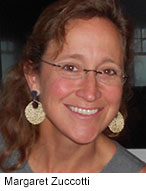
FRIDAY, Oct. 5 (HealthDay News) — Margaret Zuccotti was nursing her third child in August of 2006 when she noticed that her breast was red, swollen and tender to the touch. Because she’d had other children, she chalked up her symptoms to a simple breast infection, and her doctor agreed.
What she thought was an infection cleared up a bit after a course of antibiotics, but it didn’t go away completely. Still, with three kids to tend to, Zuccotti nearly forgot about her symptoms. But in early September, she felt a lump in her breast. Although she still thought this was an infection or another nursing-related issue, she went to see her obstetrician.
“I could tell right away that there was concern,” she recalled. “They asked me to stay so that I could have an ultrasound, and then a mammogram. They told me there was a mass there, but they didn’t know what it was. They told me to go see a surgeon as soon as possible.”
Zuccotti remembers being surprised by their concern. “I was just 37,” she said. “I am the youngest of five girls. We have no family history of breast cancers.”
The surgeon immediately confirmed the breast cancer diagnosis just from the exam, though he also did a fine-needle biopsy. Further tests revealed a spot on Zuccotti’s skull and multiple spots on her liver, she said.
Her treatment at Fox Chase Cancer Center in Philadelphia involved seven months of weekly chemotherapy with the drugs Taxol and Herceptin. Then she was switched to Herceptin only, a drug she said she still gets every three weeks.
“Taxol is tough on your system,” Zuccotti said. “I did lose my hair, and I didn’t feel great, but I was able to move around and do a light jog sometimes. I needed to get some extra help, but it was manageable.”
She said she had a mastectomy in August 2010 “because I wanted to know that I had done everything I could have done.” She also gets scans once a year now to make sure the cancer hasn’t come back.
She said that though her doctors won’t make promises, they’re hopefully optimistic. “I consider myself very lucky,” Zuccotti said.
“When things hurt a little or are sore, people who’ve had cancer, worry,” she said. “It may just be an age thing, but I become terribly frightened when I have new symptoms.”
Of course, given that she runs four to five miles a couple of times a week, chances are good that Zuccotti may have some aches and pains. But, she said, she believes that keeping active has “had a positive impact on my survival.”
Her advice to other women? “Listen to your body,” she said. “I’m glad I acted and got to the doctor.” Too often, she said, women put off going to the doctor because they’re taking care of everyone else or, if they’ve found a lump, because they’re scared of what the doctor might tell them. But the sooner you get diagnosed, she said, the better your chances of survival.
“There are no guarantees, but I believe the more you know, the better you’ll do,” Zuccotti said. “Stay informed. Stay active. Stay hopeful.”
More information
A companion article offers more information on inflammatory breast cancer.

